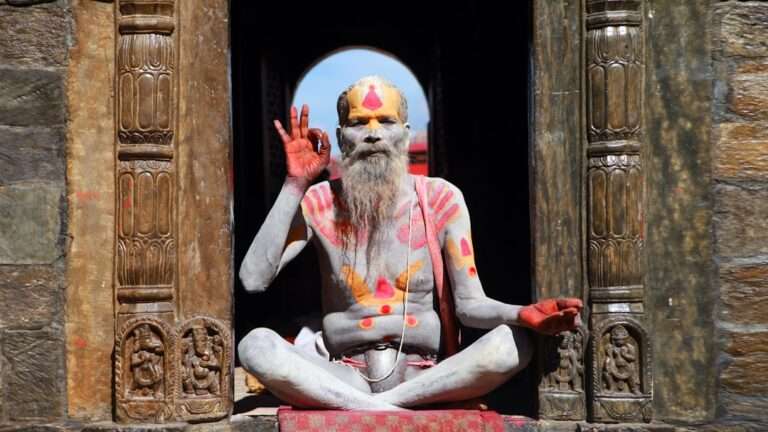How is the elephant symbol used in Hinduism?

The elephant occupies a prominent position in Hinduism, being regarded as a sacred and venerated creature. Hindu mythology associates elephants with numerous deities, and they frequently symbolize strength, wisdom, and abundance. The elephant’s symbolic significance in Hinduism is deeply embedded in ancient traditions and belief systems, and it remains a crucial emblem in Hindu cultural and religious practices.
The most notable elephant-headed deity in Hinduism is Ganesha, who is widely worshipped as the remover of obstacles and the god of new beginnings. Elephants are also associated with other Hindu gods and goddesses, such as Indra, the king of gods, who rides the white elephant Airavata. In Hindu iconography, elephants are often depicted supporting the world or guarding temple entrances, further emphasizing their importance in the religion.
The reverence for elephants extends beyond mythology, influencing various aspects of Hindu life, including art, architecture, and rituals.
Key Takeaways
- The elephant is a significant symbol in Hinduism, representing strength, power, wisdom, and good luck.
- Ganesha, the elephant-headed god, is one of the most widely worshipped deities in Hinduism and is revered as the remover of obstacles.
- In Hindu mythology, the elephant is associated with the cosmic forces of creation and destruction, and is often depicted as the mount of various gods and goddesses.
- The elephant is a symbol of physical and mental strength, as well as the ability to overcome obstacles and challenges in life.
- In Hindu art and architecture, the elephant is often depicted in sculptures, paintings, and carvings as a symbol of prosperity and good fortune.
The Elephant-headed God: Ganesha
The Symbolism of Ganesha’s Elephant Head
Ganesha, one of the most widely worshipped deities in Hinduism, is revered as the remover of obstacles, the patron of arts and sciences, and the deva of intellect and wisdom. His elephant head is symbolic of his wisdom and intelligence, and his large ears represent the importance of listening and understanding.
Ganesha’s Characteristics and Associations
His trunk is believed to symbolize adaptability and the ability to overcome any obstacle. Ganesha is often depicted with a mouse as his vehicle, symbolizing his ability to control desires and overcome obstacles. His association with the elephant makes him a popular deity in Hindu culture, and he is often worshipped before beginning any new endeavor or undertaking.
The Myth of Ganesha’s Elephant Head
Ganesha’s elephant head is said to have been given to him by Lord Shiva, his father, after he was beheaded by Shiva’s attendants. In some versions of the myth, Ganesha’s head was replaced with that of an elephant to bring him back to life. This story symbolizes the idea of rebirth and transformation, as well as the concept of overcoming obstacles and challenges.
Ganesha’s Significance in Hinduism
Ganesha’s elephant head is a powerful symbol of strength, resilience, and the ability to overcome adversity, making him a beloved and revered deity in Hinduism.
The Symbolism of the Elephant in Hindu Mythology

In Hindu mythology, the elephant is associated with various deities and has deep symbolic significance. The elephant is often depicted as a mount for several Hindu gods and goddesses, including Indra, the king of the gods, and Lakshmi, the goddess of wealth and prosperity. The elephant is also associated with Airavata, the mythical white elephant who carries Indra, and is considered the king of all elephants.
In Hindu mythology, the elephant is often seen as a symbol of power, strength, and fertility. It is also associated with rain and fertility, as elephants are believed to bring rain and prosperity. The elephant is also associated with the concept of dharma, or righteous living, in Hindu mythology.
The elephant’s gentle nature and its ability to coexist peacefully with other animals are seen as a reflection of dharma. In Hindu mythology, the elephant is also associated with the concept of sacrifice and selflessness, as elephants are known for their loyalty and devotion to their herds. The elephant’s symbolism in Hindu mythology reflects its importance as a sacred and revered animal in Hindu culture.
The Elephant as a Symbol of Strength and Power
In Hinduism, the elephant is often seen as a symbol of strength and power. The elephant’s large size and formidable strength make it a powerful symbol in Hindu mythology, representing the ability to overcome obstacles and challenges. The elephant’s association with powerful deities such as Indra, the king of the gods, further emphasizes its symbolism as a creature of great strength and power.
The elephant’s strength is also reflected in its role as a mount for various deities in Hindu mythology. Indra, the king of the gods, is often depicted riding on his mount Airavata, a mythical white elephant with multiple trunks. This association with powerful deities further reinforces the elephant’s symbolism as a creature of immense strength and power.
The Elephant as a Symbol of Wisdom and Intelligence
In addition to its association with strength and power, the elephant is also seen as a symbol of wisdom and intelligence in Hinduism. The elephant’s large ears are often seen as a symbol of attentive listening and understanding, emphasizing the importance of wisdom and knowledge in Hindu culture. The elephant-headed god Ganesha is revered as the deva of intellect and wisdom, further emphasizing the elephant’s association with these qualities.
The elephant’s trunk is also seen as a symbol of intelligence and adaptability in Hindu mythology. The trunk’s ability to grasp objects and perform intricate tasks reflects the elephant’s intelligence and problem-solving abilities. In Hindu culture, the elephant’s symbolism as a creature of wisdom and intelligence is deeply revered and celebrated.
The Elephant as a Symbol of Good Luck and Prosperity

In Hinduism, the elephant is often seen as a symbol of good luck and prosperity. The elephant-headed god Ganesha is revered as the remover of obstacles and the bringer of good fortune, making him a popular deity for those seeking success and prosperity. Ganesha’s association with wealth and prosperity has made him a beloved deity in Hindu culture, and he is often worshipped before beginning any new endeavor or undertaking.
The elephant’s association with Lakshmi, the goddess of wealth and prosperity, further emphasizes its symbolism as a creature of good luck and abundance. In Hindu culture, elephants are often depicted carrying symbols of wealth and prosperity, such as coins or jewels, further reinforcing their association with good fortune.
The Elephant in Hindu Art and Architecture
The elephant holds a prominent place in Hindu art and architecture, where it is often depicted in various forms and styles. Elephants are commonly featured in Hindu temple architecture, where they are carved into pillars, walls, and doorways as symbols of strength, power, and protection. In Hindu art, elephants are often depicted in intricate designs and patterns, reflecting their significance as sacred animals in Hindu culture.
In addition to temple architecture, elephants are also featured in various forms of Hindu art, including paintings, sculptures, and textiles. Elephants are often depicted in vibrant colors and intricate designs, reflecting their importance as symbols of strength, wisdom, and prosperity in Hindu culture. In conclusion, the elephant holds deep symbolic significance in Hinduism, representing strength, power, wisdom, intelligence, good luck, and prosperity.
The elephant’s association with powerful deities such as Ganesha and Indra further emphasizes its importance as a sacred animal in Hindu culture. Its prominent place in Hindu art and architecture reflects its significance as a revered symbol in Hindu mythology and religious practices.
FAQs
What is the significance of the elephant in Hinduism?
The elephant is considered a symbol of wisdom, strength, and prosperity in Hinduism. It is associated with the Hindu deity Ganesha, who is revered as the remover of obstacles and the god of beginnings.
How is the elephant symbol used in Hindu rituals and ceremonies?
In Hindu rituals and ceremonies, the image of an elephant is often used as a representation of Ganesha. It is common to see elephant statues or motifs in temples, homes, and during religious festivals.
What is the role of the elephant in Hindu mythology?
In Hindu mythology, the elephant is closely associated with Ganesha, who is depicted with an elephant head. This unique form of Ganesha symbolizes wisdom, intelligence, and the ability to overcome obstacles.
How does the elephant symbolize prosperity in Hinduism?
The elephant is considered a symbol of prosperity in Hinduism due to its association with Ganesha, who is believed to bring good fortune and success. In Hindu culture, the elephant is also seen as a symbol of abundance and fertility.





